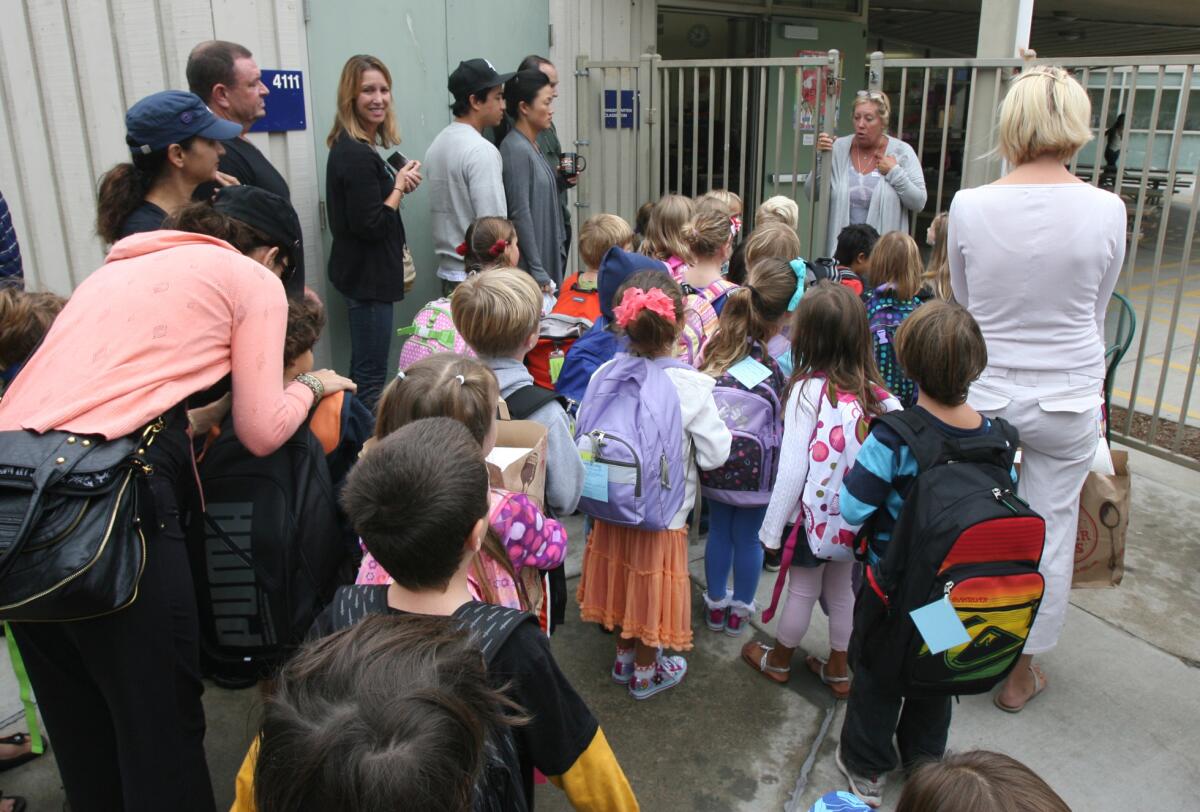More time in kindergarten doesn’t mean better children

Kindergartners on their first day of class at Top of the World school in Laguna Beach in 2010.
- Share via
They say we learned everything in kindergarten, but the reasons have nothing to do with the three Rs: reading, writing and arithmetic.
The lessons came from playing in the dirt, sharing our toys and trying not to fight.
Nowadays, however, adults are trying to eke out more educational efficiency by turning kindergarten into an all-day academic decathlon.
In Laguna Beach, for example, educators recently decided that it’s better to have kindergartners in school all day instead of a half day.
The reasons always sound noble on paper: Better prepared for first grade. More time for teachers to assess children’s abilities. More time for at-risk children to catch up. And, ironically, more time for free time.
The benefits of a half-day program are a little softer. More time for parent-child bonding outside of school. Easier transition into first grade or “real school.” Less stressful on children. And, of course, cheaper for school districts.
Perhaps it’s not a contest about which approach is correct. Perhaps it’s more about where we place our values and priorities.
Consider the history and intent of kindergarten, or “a garden of children.” The very German word puts the emphasis on discovering and cultivating nature.
To this day in Germany, children ages 3 to 5 spend all of their time doing little to no academic work. Instead, they have circle time, free play, snack time, recess, lunch, more free play and mandatory garden time — rain or shine.
It was Europe, after all, that popularized the saying, “There’s no such thing as bad weather, only bad clothing.”
The point here is that the Germans, Scandinavians and many other high-performing countries around the world have figured out something that eludes their U.S. educational counterparts: Extra class time does not always equal better grades.
In fact, several countries have a shorter school year than the 180 days that are typical of local districts, and yet their students perform better than U.S. kids.
Why? Because learning and insight don’t always come from numbers and letters. The good stories of life, the indelible memories that will stay with someone forever, come from the once-in-a-lifetime experiences of early childhood.
Which brings us back to the garden.
When kindergartners return home from school, what do they eagerly tell their parents? That D comes after C or that they saw a garden snake in the garden?
To be fair, maybe it’s not either-or. Maybe with a full day in kindergarten, teachers can craft a perfect balance between academics and mystery. Perhaps wonder can thrive at 2 in the afternoon in an overcrowded classroom filled with cranky children who just want to go home.
Rest assured, we will have the remainder of our lives to fill up with busy work. By the time first grade hits, students are on the fast track to college. Even summers now are largely gone.
Parents, meanwhile, are either distracted by their own work or clinging to impossible work-life schedules, racing to after-school functions, camera in hand.
Video of the school play posted to Facebook — check.
Selfie making school snacks — check.
But is that real or manufactured?
Have we turned the kindergarten experience into a test score?
A respected study, the Third International Mathematics and Science Study, was first published in the mid-1990s and is updated every four years. It is considered to be the most important international study of education, because it compares achievement across nearly 50 countries.
Among its many findings is that an increase in classroom time does not necessarily improve test scores.
In four of the seven countries that outperform the U.S. in mathematics, the students spend less time in class per week than their American counterparts. For example, in Sweden students are among the highest performers, but their school year is only 170 days long.
And if you’re wondering about Swedish kindergartens, most of their curriculum is playing outside — even in snow. The kids throw snowballs. Get wet. Have awesome naps.
The focus is on the values of sportsmanship, tolerance and consideration.
When the time is right — and there will be time — students will learn the three Rs. But for now, let our children learn how to build amazing, authentic stories.
DAVID HANSEN is a writer and Laguna Beach resident. He can be reached at hansen.dave@gmail.com.



